Intro
Welcome to this week’s gaming post! Last week I talked about my overall experience this year at PAX Unplugged 2024, including highlights from the convention and a few tips and tricks I learned along the way that I recommend you check out here. This week, I’ll be talking about the games I managed to play and demo. There were a lot of games I managed to try, and rather than rank each one, I’ve categorized them under different sections, including my favorites and disappoints. There are a lot of games to talk about, so without further ado, strap in, and let’s jump into the games!
The Highs: My Favorites
Civolution – leading off with the heaviest and longest game I played at the convention is Civolution. I was more than a bit worried when the rules teach took almost an hour and a half by itself, but once we got going, I actually really enjoyed the mechanisms and gameplay. Player turns are fairly straightforward and quick, as the majority of your turns involve using two dice from your player board to activate an action, and the actions themselves are also relatively easy to understand once you have a handle on the iconography. The big elephant in the room with Civolution is its length and rules overhead, and I imagine there are going to be a lot of people who turn away because of these factors. Even though we took our turns almost at light speed because we were trying to finish the game before lunch, we still only finished three of the four rounds after another 2+ hours of playtime after the teach. Having played the game, I think I could greatly shorten the teach, but even then, I would still be hesitant about teaching this often to new players. However, if you have a dedicated group of gamers who are able to get over that initial hurdle, there’s a satisfying game under the surface.
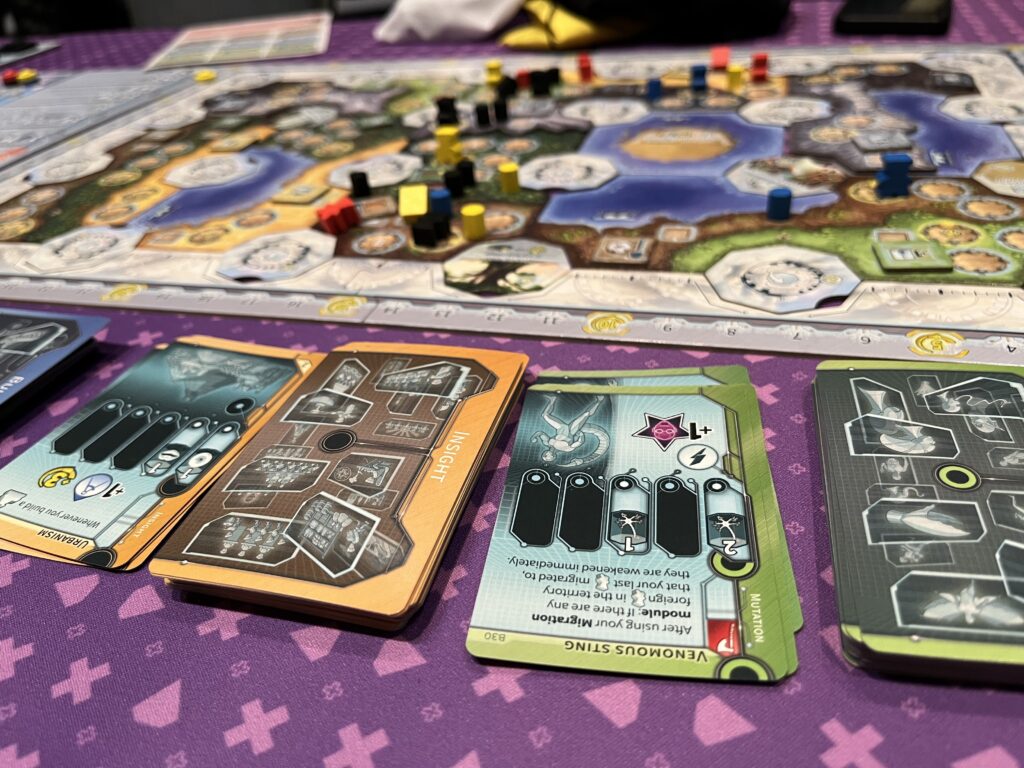
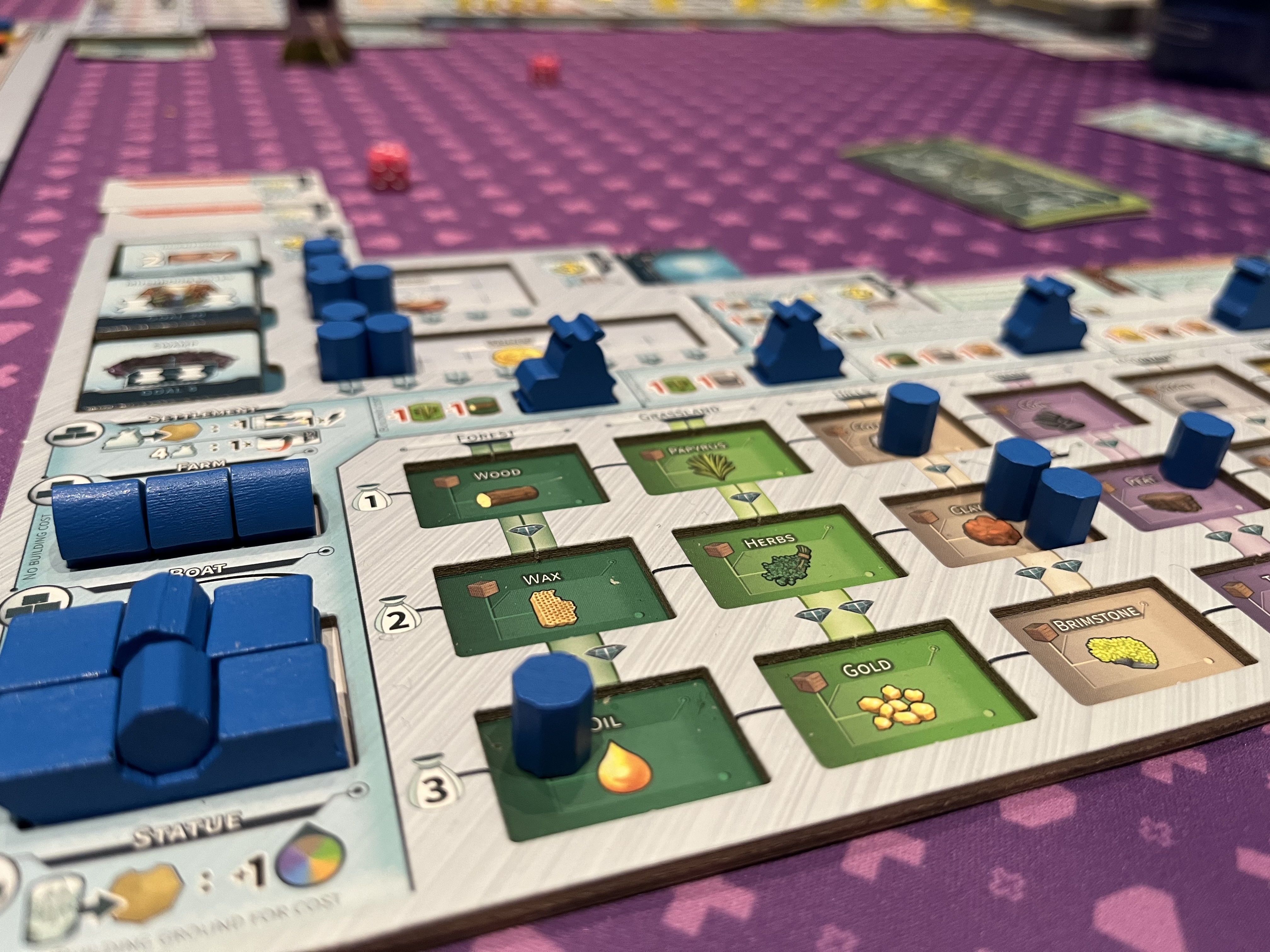
Last Will – this one is an older title that I never got around to playing, but we were able to get in a quick game thanks to the freeplay library. The game has a very unique theme where you are competing to be the first player to spend all of your money as a test so that you can inherit your rich uncle’s fortune. The game has a bit of everything, a turn order track akin to something like Viticulture, worker placement, and tableau building. While it may seem like there’s a lot of different mechanisms going on, the gameplay is actually really smooth, and we were able to get a two-person game finished in under an hour, including learning the rules, setup, and teach. The theme is a big standout here, as well as the engine building, and I certainly wouldn’t hesitate to play this one again.
The Fellowship of the Ring: Trick-Taking Game – while this game feels like it borrows a lot from The Crew, I did enjoy the first scenario in the game I got to demo. The first scenario played a lot like The Crew with each player having a goal they needed to accomplish; however, I was told that later scenarios mix the core formula up a bit more. While it’s still too early to tell whether it’s worth owning both this game and The Crew, this did appear to be one of the most popular games at the convention with their limited copies selling out each day in less than 30 minutes.
Art Society – I never got around to playing this game when it released last year, so I’m glad I got to try it out. This game is a fairly straightforward auction and polynomial game. The most interesting aspect of the game is how tiles score. At the end of each bidding round, the art piece that doesn’t get selected increases the value of that art type for final scoring. Therefore, towards the end of the game, in addition to considering which tiles would fit in your display, you also had to think about what art was either the most valuable or what type you wanted to increase the value of. Overall, I enjoyed this game as a nice break from some of the heavier affair we played.
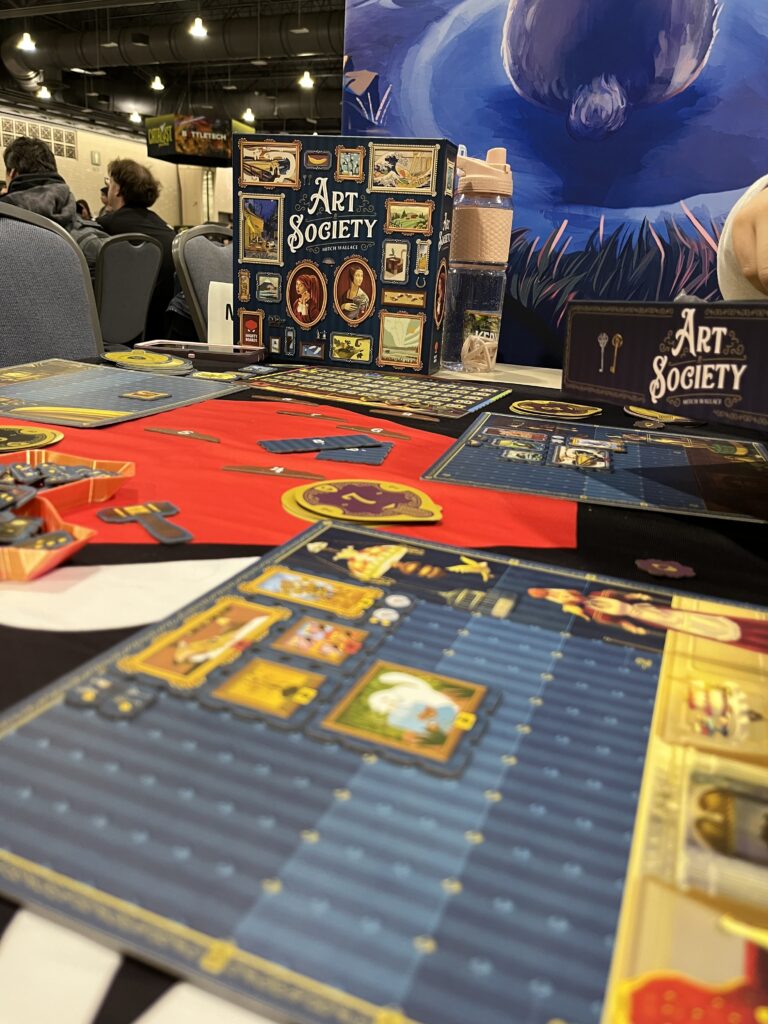
The Mids: Games I Enjoyed but Wouldn’t Seek Out
Ironwood – we were able to demo this asymmetric, two-player game from Mindclash Games. While we stopped about halfway through, I enjoyed the card element and map control. Each faction has separate areas of the map they’re able to occupy, as well as a unique deck and goals they are trying to achieve to win the game. At the end of the day, I enjoyed what I saw and would happily play it again if someone else brought it out, but from what I played, there wasn’t enough about the game that felt overly unique that would encourage me to keep coming back often.
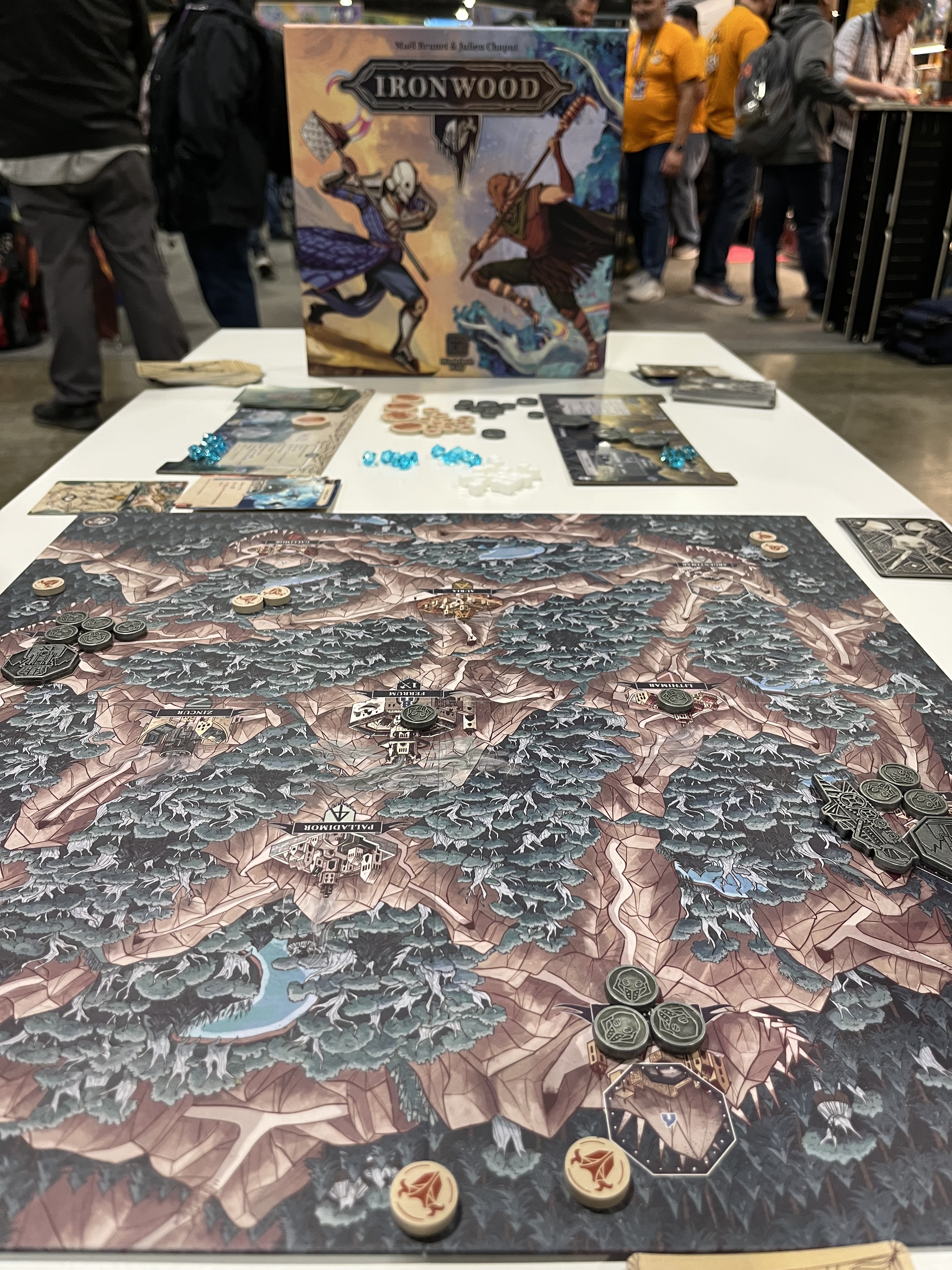
River Valley Glassworks – this was the last game we played at the convention. The game is mostly about set collection with a system that sort of reminds me of the goods system in Above and Below. Each color of glass has a certain rarity, corresponding to the total number of that color in the game. The goal is to complete rows (one of each color), as well as columns (all of the same color), with your two highest columns scoring points at the end of the game.
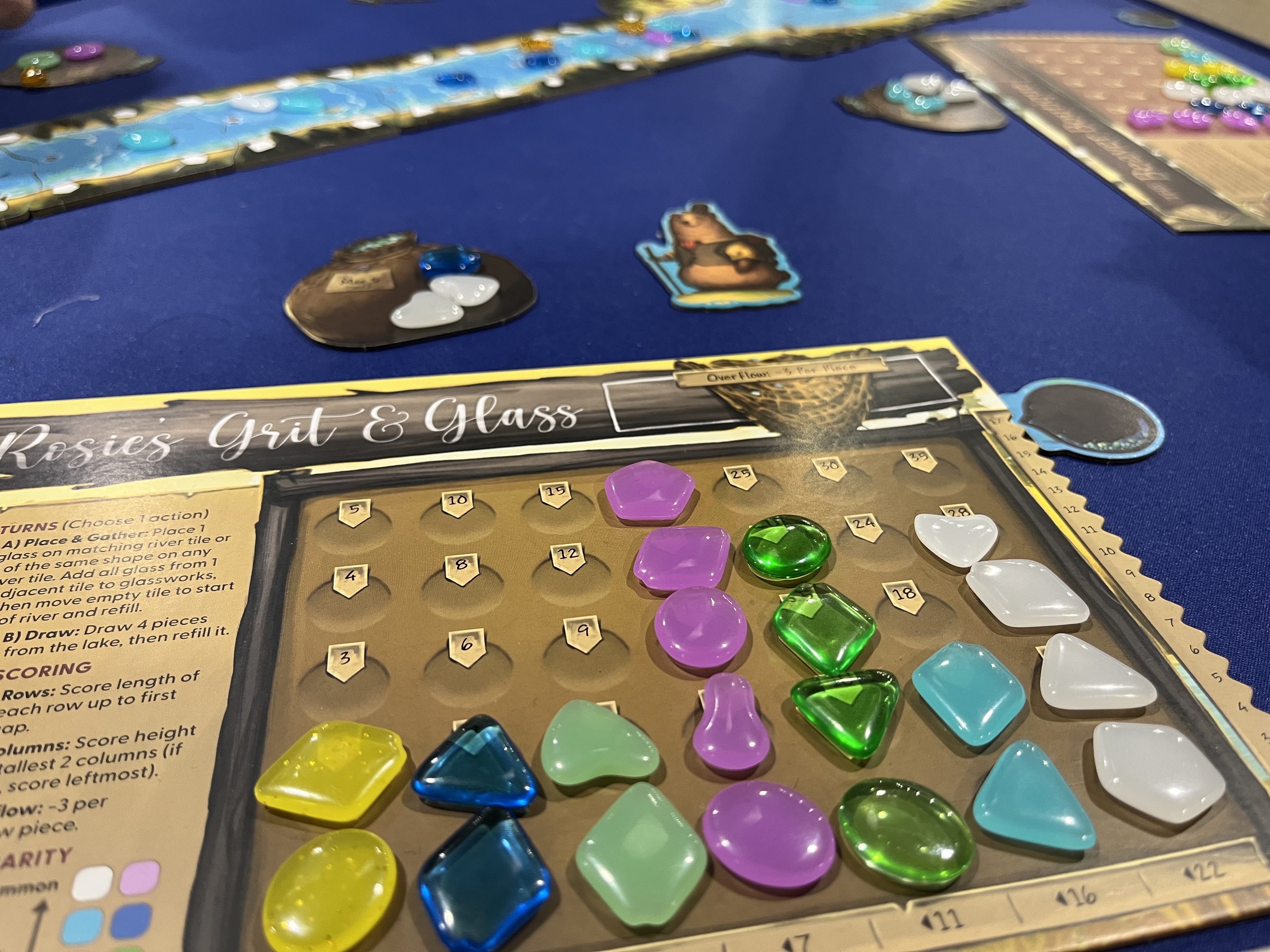
Floriferous – this is a light filler game where the theme is to add flower cards to your garden. At the beginning of every round, you select one card from each column from a tableau. Depending on which card you select, the row of the card determines your player order for the following column. You’re essentially choosing flowers to complete public objectives, as well as score points based on other types of cards you can acquire. The game is a perfectly decent filler game with some nice artwork, but there wasn’t enough interesting decision-making for my taste.
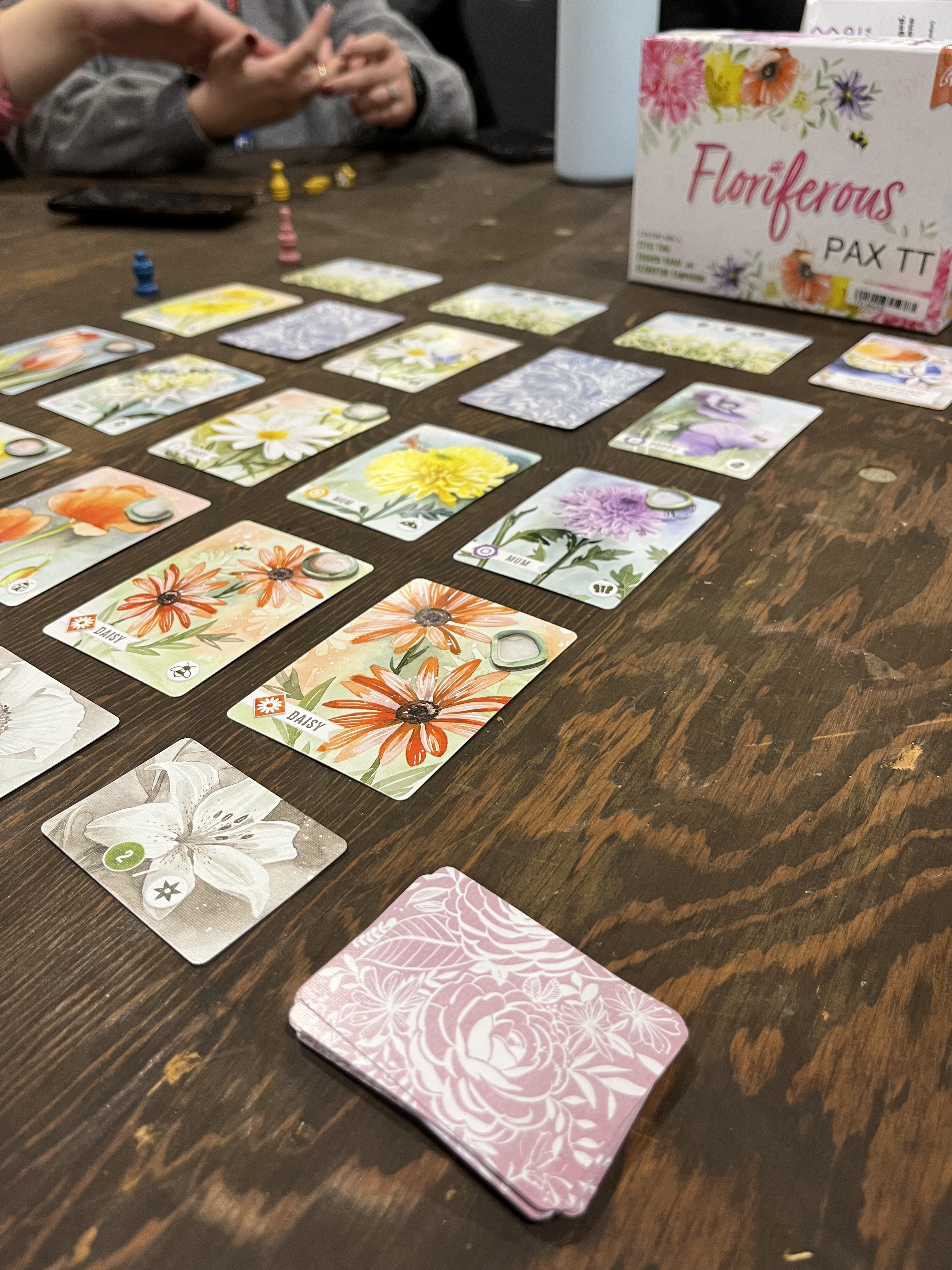
The Lows: Games I Didn’t Quite Enjoy
Fort – this is a cute deck-building game from Leder Games. We also were able to play this from the freeplay library. I like games that utilize deck building, but for some reason it didn’t work as well for me here. Granted this was my first time playing the game, but I was never able to get a proper engine up and running as there’s an interesting mechanism where if you don’t use a card from your hand by the end of your turn, other players can take it and add it to their deck. While an interesting concept, it made it difficult to track what cards were still a part of my deck. The theme and aesthetic are nice, but if I’m looking for a deck building game, I’ll probably choose something else.
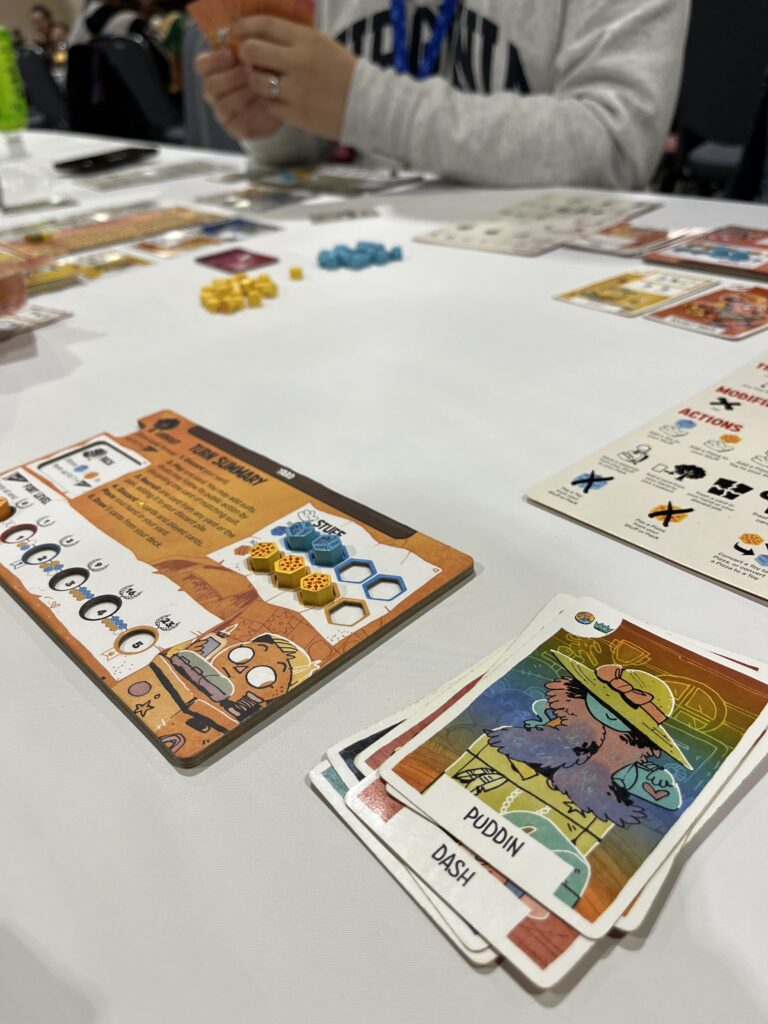
Shackleton Base: A Journey to the Moon – this is one of the newest games on this list, and I’m not sure this has even hit US retail yet. We were able to demo this game in the First Look area. I’ll be the first to admit that I think most of our negative experience of this game was down to us struggling to understand the rules, and we ended up stopping after about one round. This is a medium to heavy game, and we were trying to learn the game for the first time directly from the rulebook and for some reason the rules were just not clicking. I have heard some early positive buzz for the game, so our experience may have just been an outlier.
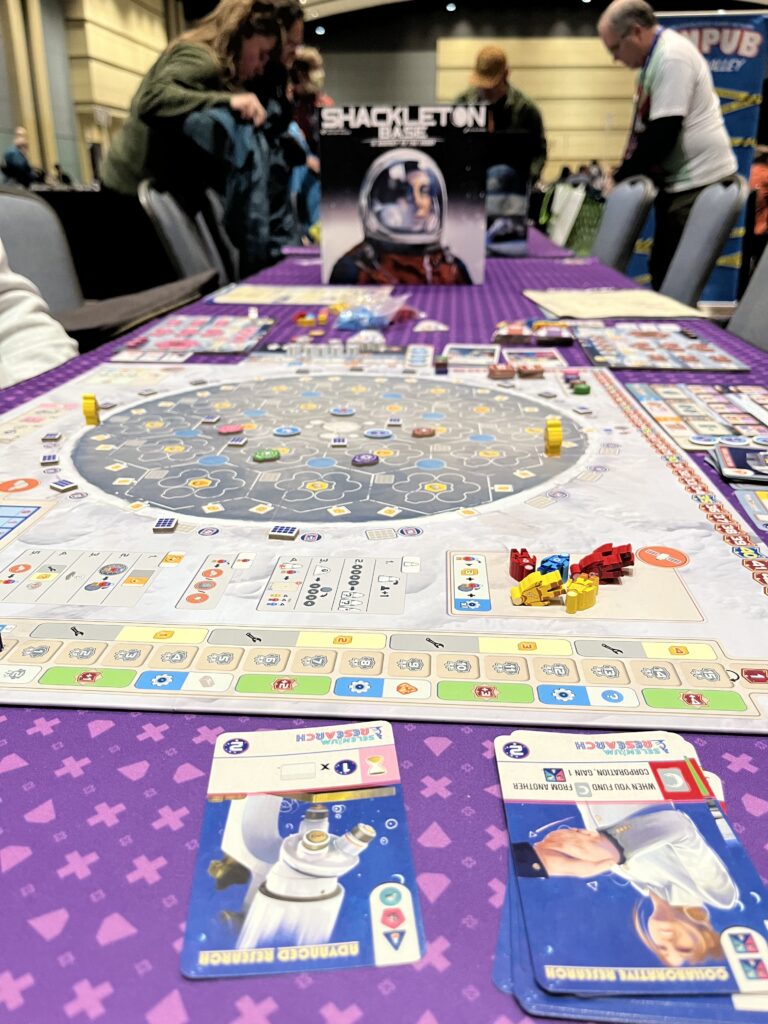
Sail – this is another small box game from publisher Allplay. Sail is a two-player, cooperative trick-taking game where you’re trying to sail your ship from one side of the board to the other. The twist on this trick-taking game is that in addition to the suit and number on each card, there’s also symbols. Once both cards have been played in the trick, based on which symbols are showing, they correspond to a certain action like being able to move your ship forward towards the goal. Personally, I enjoy trick-taking games where the tricks themselves are speedy and you are able to get into a groove. However, in Sail, I constantly had to keep checking which pair of symbols correspond to which action which caused the game to slow down. If you played this game often, you’d probably memorize what the symbol combinations are, but there are other cooperative trick-taking games I would rather play than this.
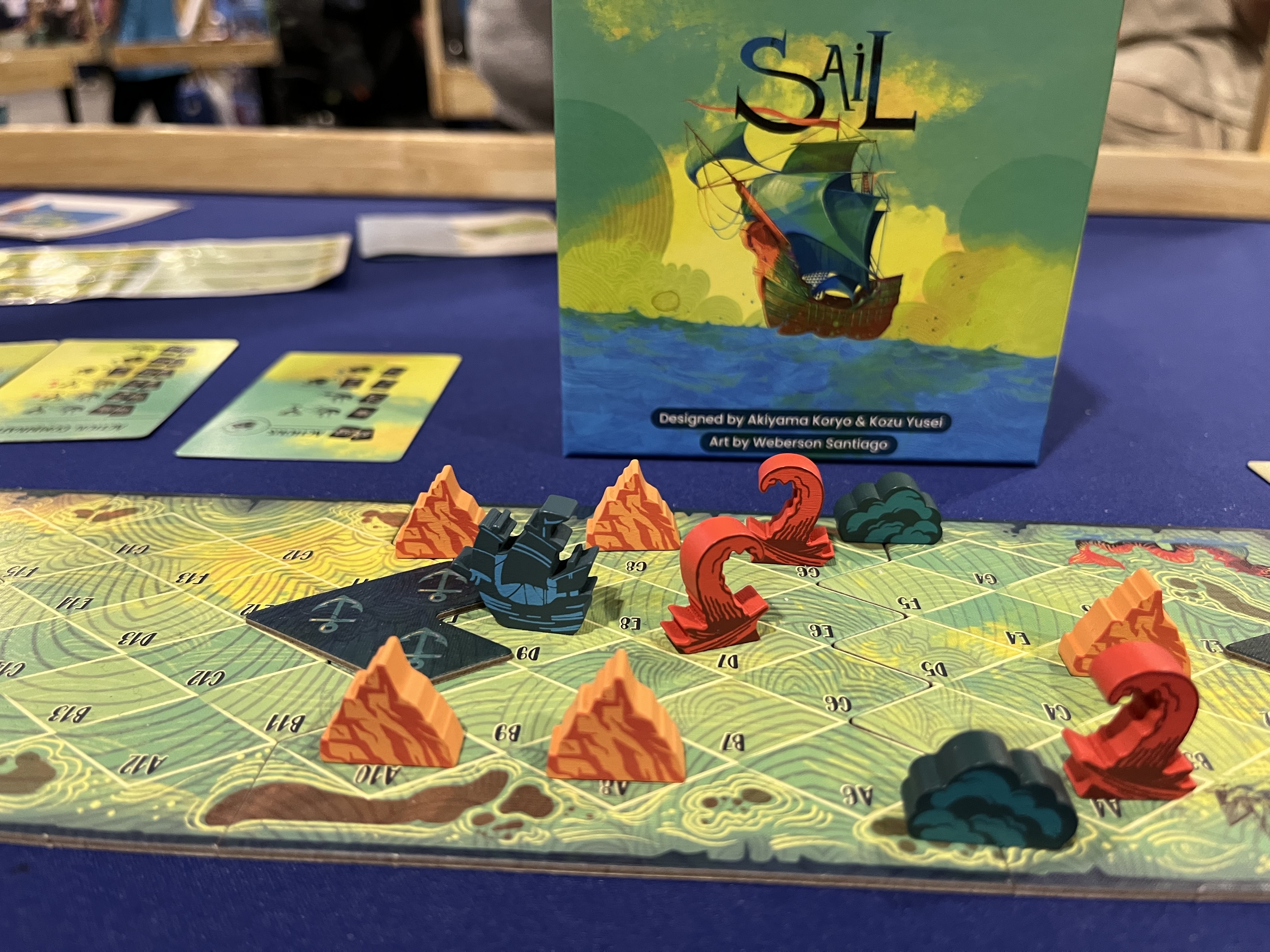
Calico – a cute tile-laying game with a quilt and cat aesthetic. I can understand why people might be drawn in by the look of the game, but this was the game I least enjoyed during PAX this year. Akin to something like Sagrada, in Calico, you’re placing tiles on your player board while trying to connect colors, patterns, and score goal tiles on your player board that have certain requirements to score. There’s just something about spatial puzzles that just don’t click for me as this was way more thinky for me than even Civolution. What appears to be a nice light and cozy game actually has a ton of brain-burning decisions if you’re trying to maximize the number of points you’ll score. You’re constantly having to juggle each of the different scoring objectives, while slowly coming to the realization that you’ll never get the exact tile you need in that moment because the other players have already taken all of those tiles. The smartest mechanism in Calico is having players place a tile first before drawing another one as it helps cut down on the downtime, but I still have no desire to ever return to this game.
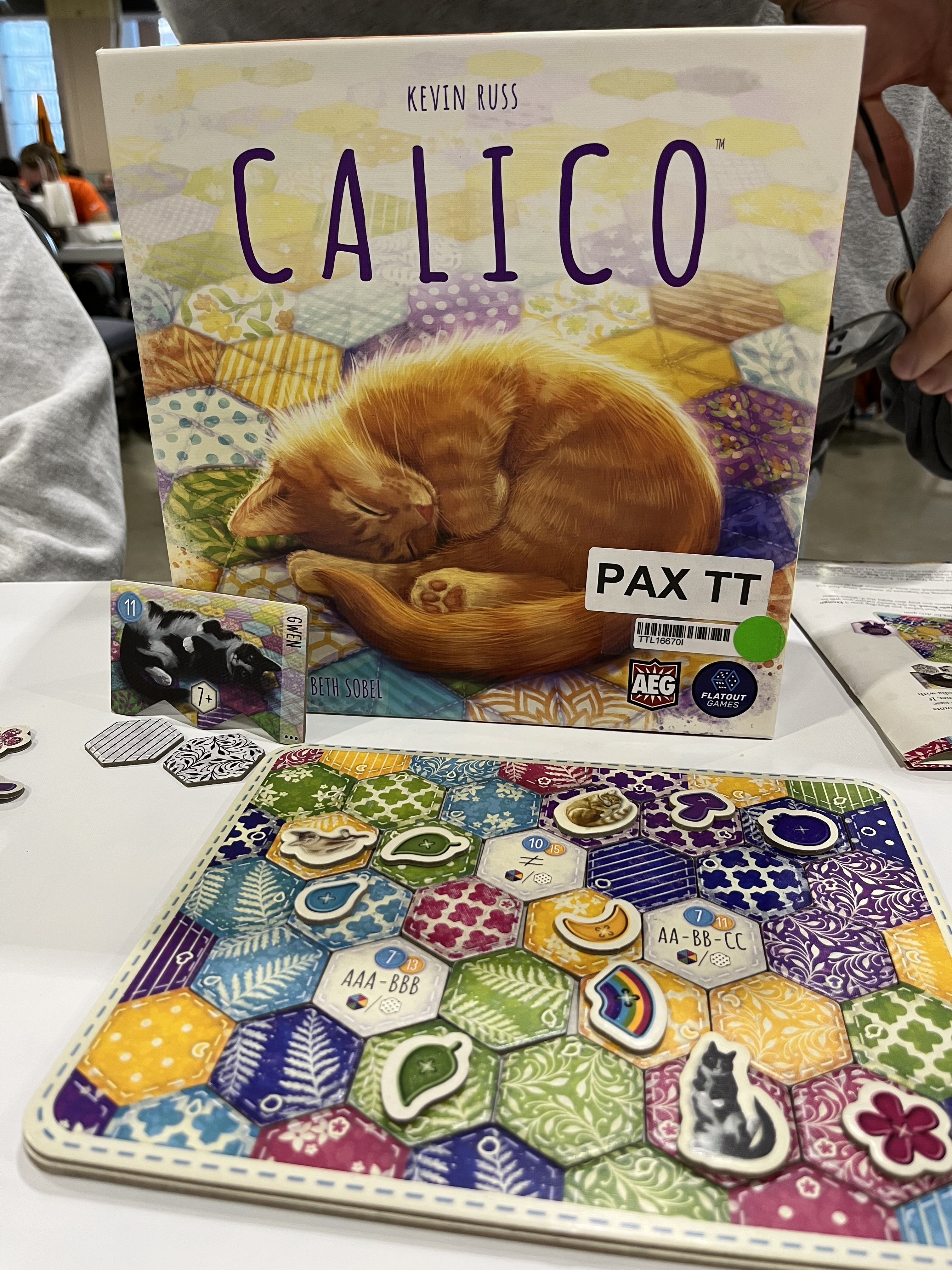
Biggest Disappointments
Revenant – I was able to demo the upcoming game from Mindclash Games that borrows the same aesthetic and theme from 2023’s very popular Voidfall. I’ve only played Voidfall once, but from initial impressions, outside of the theme and artwork, Revenant is a completely different game. Revenant is a worker placement game where you place one of your workers on an available ship to carry out the actions shown. We played through the full first round, with each player getting to take three actions, as well as see end of round stuff like how the Voidborn come into play. The game is supposed to feel like you’re constantly playing from behind against the Voidborn, as each round spawns a new host of enemy ships to deal with. We didn’t see the mechanism come into play, but I imagine a key part of the game is taking a worker placement spot that allows you to hyperjump, effectively resetting the enemies and planets. However, one of the players has to choose to take the action which isn’t cheap in terms of resources needed; while the action does provide a reward, my worry would be that it could come down to a game of chicken where no one player wants to be the one to trigger the hyperjump, so all of the friendly ships just end up getting destroyed. I was told that the game is still in development as they are still tweaking some of the mechanics and there was still a lot of placeholder art on cards. This game isn’t slated to release until late next year, so there’s still time for them to make changes before the game releases, but personally, from what I saw in my short one round demo, there’s an interesting idea here, but it definitely needs more time in the development room.
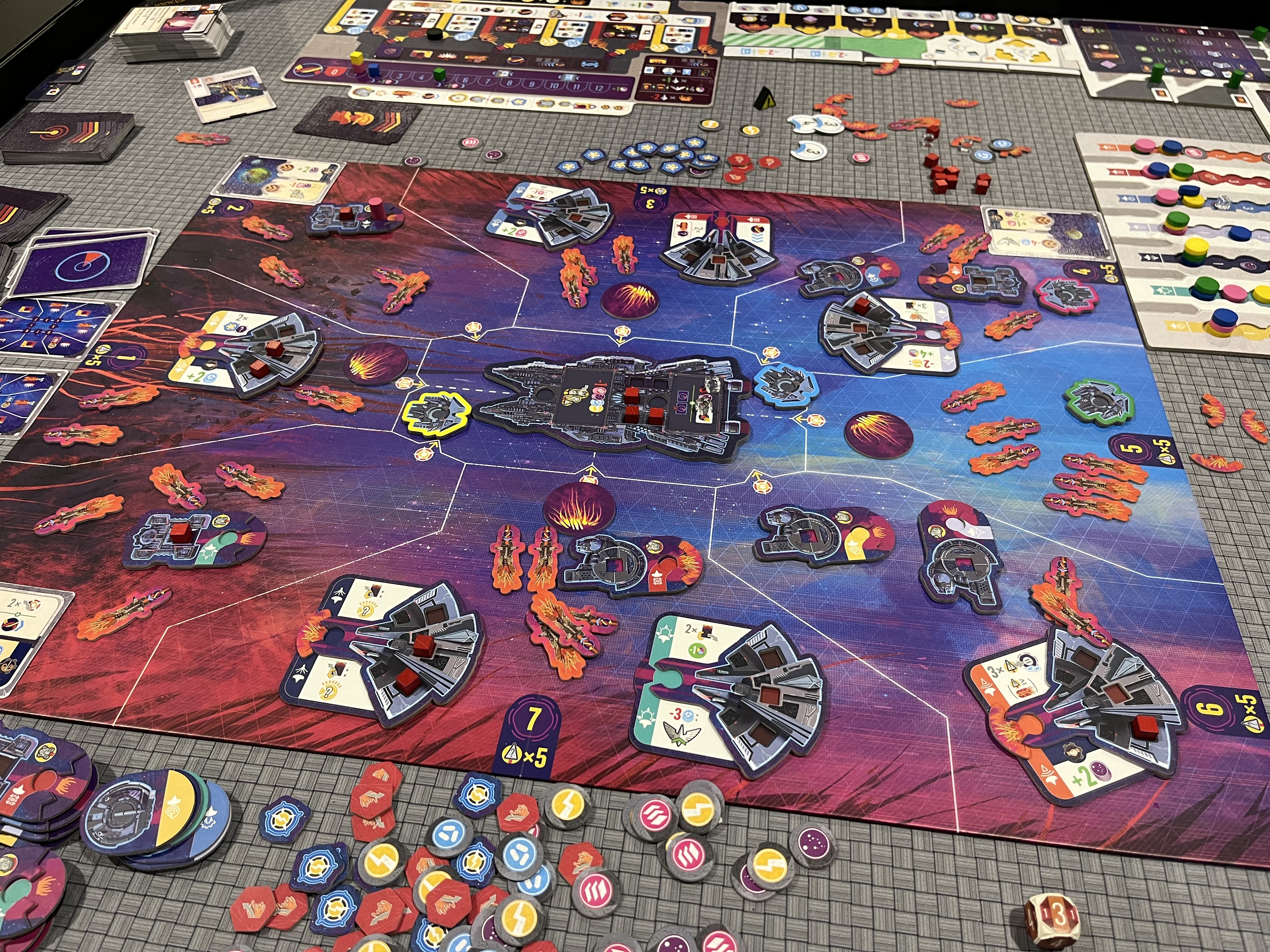
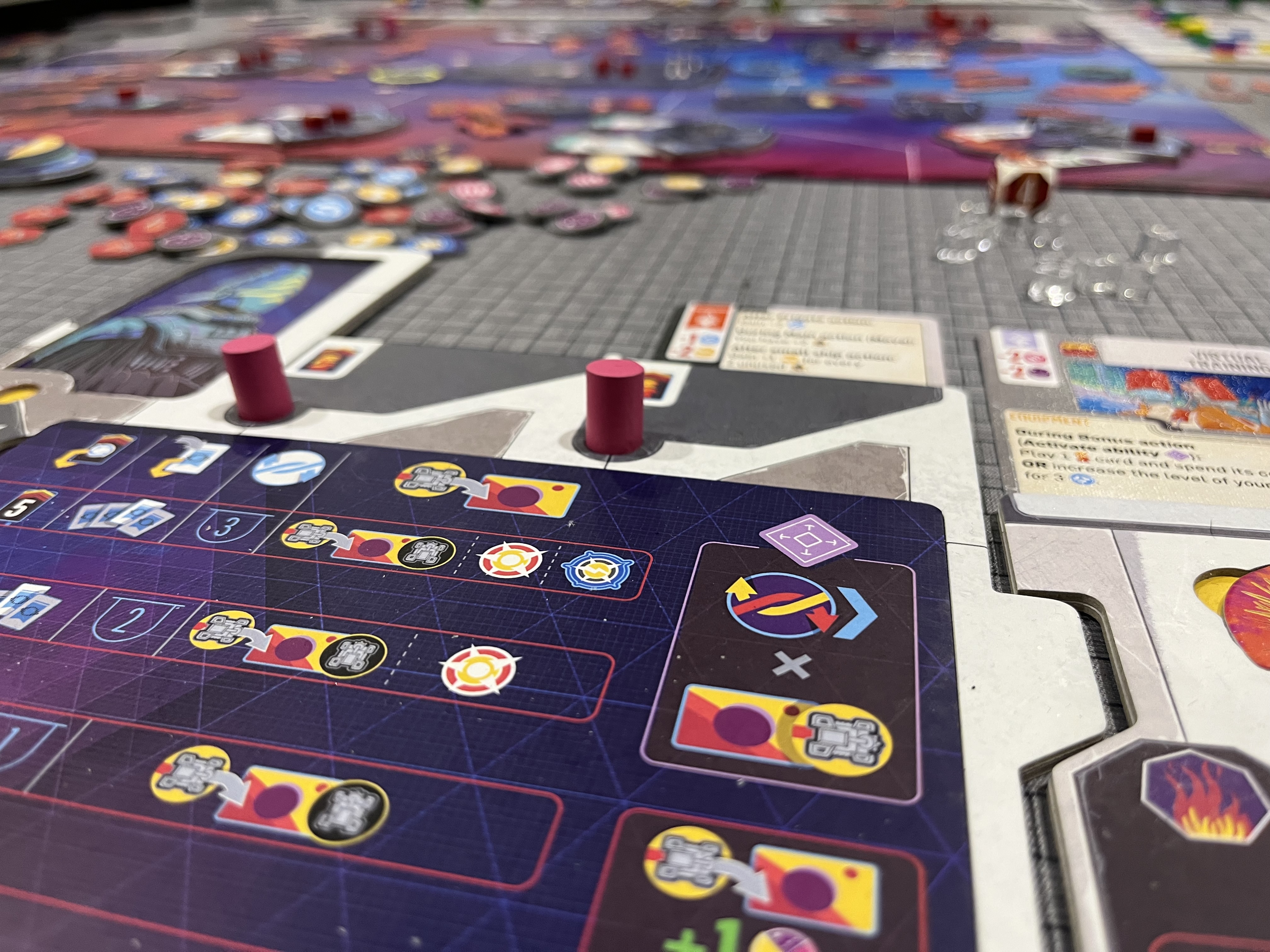
Too Early to Tell
Andromeda’s Edge – I was able to play three turns of this year’s sequel to the very popular Dwellings of Eldervale. For the demo, we were dropped into a game that was already underway, and our first two turns were scripted. However, on our final turn, we given free rein. The game is essentially a worker placement game where you’ll be placing ships onto tiles to carry out actions. Having never played Dwellings, I came into the demo new to the mechanisms and was admittedly pretty lost with what was happening. By the end of the demo, I definitely had a better idea of how the game played than I did going in, but I’m not sure I really understood what the overall goal of the game was. It felt like you were often able to chain actions together on your turn, which is always satisfying, but I would worry about the potential downtime between turns at higher player counts. It does appear that combat might help in this regard, as combat was happening regularly and other players would be able to join in, provided they had a ship within range. I’m generally not a fan of in-your-face combat in games, but here it seems like even if you lose a combat, it’s not very punishing and you’ll still usually get something out of it. I’m putting this in a category of its own because there was a lot that I couldn’t tell from just my brief demo, but this one is still definitely still on my radar to check out at some point in the future.
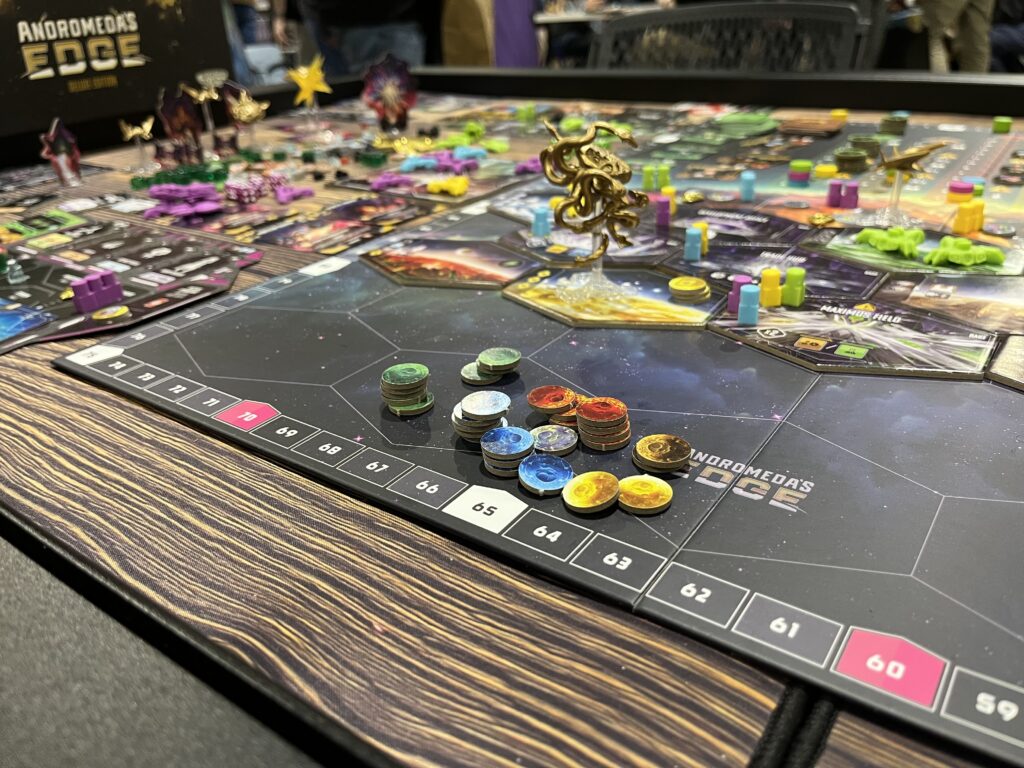
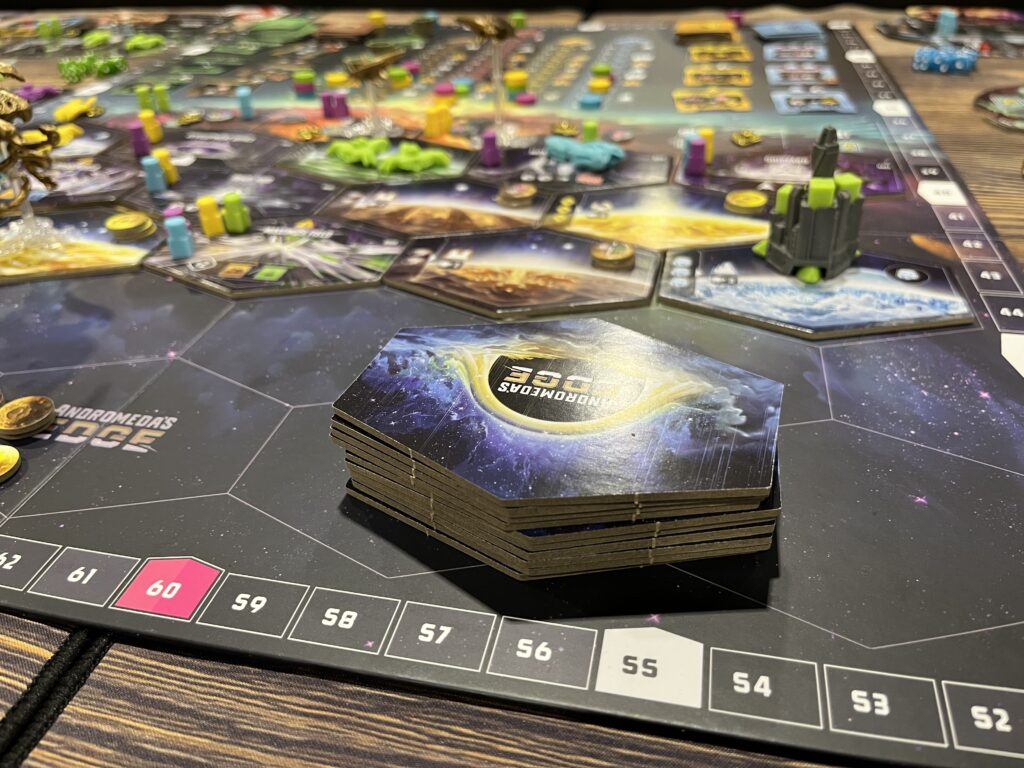
Closing
With that, I’ll wrap up my experience at PAX Unplugged this year. I’m looking forward to attending the convention again next year, but in the meantime, I’d love to hear your thoughts on any of the games I’ve mentioned, future content, or format in the comments section below, and let me if you attended PAX Unplugged this year and what your highlights were. Happy gaming!
If you liked this post and want to be notified when new content is released, then follow me on Instagram @themeepledigest.
